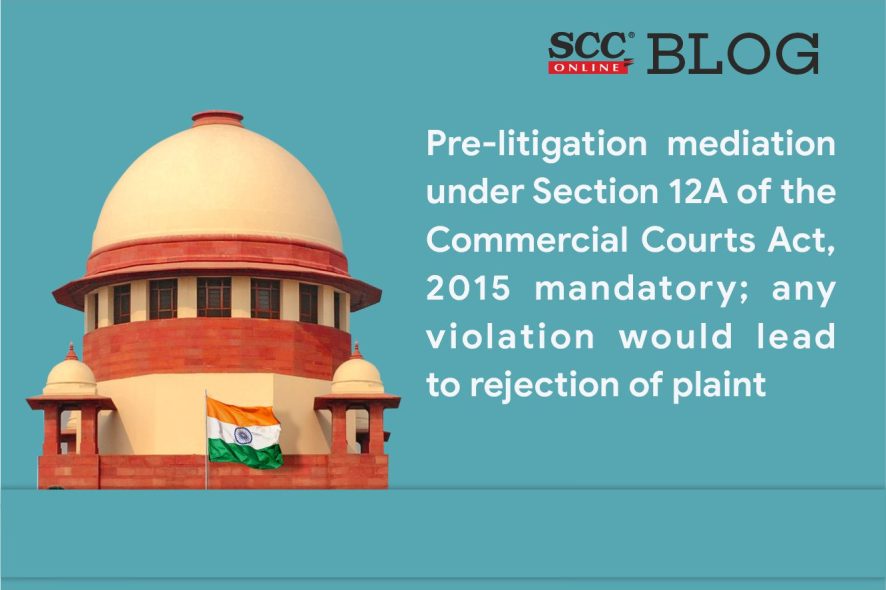Supreme Court: The bench of KM Joseph and Hrishikesh Roy, JJ has held that the statutory pre-litigation mediation under Section 12A of the Commercial Courts Act, 2015 is mandatory and any suit instituted violating the mandate of Section 12A must be visited with rejection of the plaint under Order VII Rule 11 of the Civil Procedure Code, 1908. This power can be exercised even suo moto by the court.
While this declaration has been directed to be effective from 20.08.2022 so that concerned stakeholders become sufficiently informed, the Court made clear that,
- in case plaints have been already rejected and no steps have been taken within the period of limitation, the matter cannot be reopened on the basis of this declaration.
- if the order of rejection of the plaint has been acted upon by filing a fresh suit, the declaration of prospective effect will not avail the plaintiff.
- if the plaint is filed violating Section 12A after the jurisdictional High Court has declared Section 12A mandatory also, the plaintiff will not be entitled to the relief.
Going into the legislative intent, the Court highlighted that Section 12A of the 2015 Act was inserted to the Act by amendment in the year 2018 as a compulsory provision. The object of the Act and the Amending Act of 2018, unerringly point to at least partly foisting compulsory mediation on a plaintiff who does not contemplate urgent interim relief. The provision has been contemplated only with reference to plaintiffs who do not contemplate urgent interim relief. The Legislature has taken care to expressly exclude the period undergone during mediation for reckoning limitation under the Limitation Act, 1963.
Further, the language used in Section 12A of the 2015 Act, which includes the word ‘shall’, certainly, go a long way to assist the Court to hold that the provision is mandatory. The entire procedure for carrying out the mediation, has been spelt out in the Rules. The parties are free to engage Counsel during mediation. The expenses, as far as the fee payable to the Mediator, is concerned, is limited to a one-time fee, which appears to be reasonable, particularly, having regard to the fact that it is to be shared equally.
Noticing that the statute which has generated the controversy is the Amending Act of year 2018, the Court observed that,
“The Amending Act containing certain Section 12A is a toddler. The law necessarily would have teething problems at the nascent stage.”
The Court, further, observed that is an undeniable reality that Courts in India are reeling under an extraordinary docket explosion. Mediation, as an Alternative Dispute Mechanism, has been identified as a workable solution in commercial matters.
The Court observed that it is an undeniable reality that Courts in India are reeling under an extraordinary docket explosion. Mediation, as an Alternative Dispute Mechanism, has been identified as a workable solution in commercial matters.
“A trained Mediator can work wonders. Mediation must be perceived as a new mechanism of access to justice.”
Hence, any reluctance on the part of the Court to give Section 12A, a mandatory interpretation, would result in defeating the object and intention of the Parliament. The fact that the mediation can become a non-starter, cannot be a reason to hold the provision not mandatory.
[PATIL AUTOMATION PRIVATE LIMITED v. RAKHEJA ENGINEERS PRIVATE LIMITED, 2022 SCC OnLine SC 1028, decided on 17.08.2022]
*Judgment by: Justice KM Joseph
For petitioner(s): AORs Ayush Negi, Santosh Krishnan, Arup Banerjee,
Advocates Chitanya Nikte, Vishakha Upadhyaya, Himanshu Tyagi,. Varnita Ojha, Sonam Anand
For Respondent(s): AORs Hetu Arora Sethi, Nikhil Swami
Advocates Saket Sikri, Ekta Kalra Sikri, Ajay Pal Singh Kullar, Vikalp Mudgal, Prabha Swami, Divya Swami
For Appellant: Senior Advocate Sanjeev Anand







